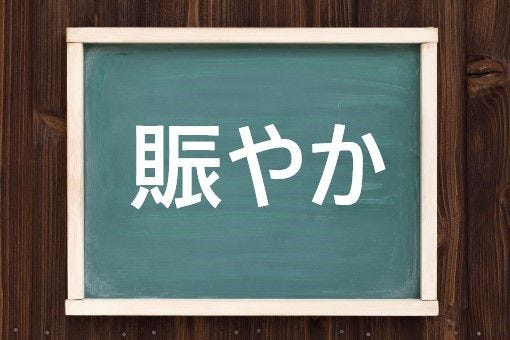にぎやか/nigiyaka/”bustling” is a word you probably learned early in your Japanese language journey. It describes a busy, lively space of some kind. It also usually implies noise: all these people are also making a racket, or are even “raucous”. And by the way all these people are also happy, boisterous, cheerful, and exuberant.
You can hardly think of a better example of nigiyaka than a Japanese matsuri festival, where the entire town gathers to eat street food and carry the mikoshi portable shrines noisily through the neighborhood.
nigiyaka is one of those words that can function either as a “noun” (にぎやかだ/nigiyaka da/“it’s bustling”) or as an “adjective” used with な/na (にぎやかな街/nigiyaka na machi/“a bustling town”). We’re not trying to teach Japanese grammar here, but this is the lexical category called “adjectival nouns”, or in Japanese 形容動詞/keiyōdōshi, also known as “na-adjective”.
You might see nigiyaka written as 賑やか, with the character 振, the underlying meaning of which is “flourish” (among others). And you might learn the related verb にぎわう/nigiwau/“come alive”. (にぎやか/nigiyaka is the state resulting from something having come alive.) But we digress.
Was the next word ending in yaka you encountered when learning Japanese possibly にこやか/nikoyaka/“smiling (ear to ear)”? Obviously, this is related to the common onomatopoetic expression にこにこ/nikoniko/“grinning broadly”. (This type of onomatopoeia is called 擬態語/gitaigo/“mimetic word” or “ideophone”—thought you’d like to know.) It’s also related to にっこり/nikkori. We will not try to tease apart the differences in nuance here.
At this point you may have begun to wonder: how many of these words ending in yaka are there anyway? What’s up with them? Where did they come from?
To answer the first question first, there are at least several dozen yaka words. More common ones you may have learned, or should if you haven’t, include
あざやか/azayaka/“vivid”
はなやか/hanayaka/“gaudy”
まろやか/maroyaka/“rounded (taste)”
おだやか/odayaka/“calm (like a baby)”
さわやか/sawayaka/“invigorated” (as when resting after a bath)
すみやか/sumiyaka/“expeditiously”, like the government promising to fix a problem without delay
ゆるやか/yuruyaka/“loose, gentle (pace, slope)”
All of these words you’re more likely to see in their hiragana form, but they also have kanji versions (in case you’re interested, 鮮やか, 華やか・花やか, 円やか, 穏やか, 爽やか, 速やか, or 緩やか).
A common thread runs through all these yaka words. Let’s look at まろやか/maroyaka. Of course we all know the word 丸い/marui which simply means “round” The yaka indicates a state in which the underlying concept has been softened and broadened and abstracted. For instance, marui would normally be applied only to physical objects, but with the yaka it becomes a more nuanced “roundish”, or “rounded”, and takes on a richer range of meanings, such as a mellow-tasting cup of coffee. One dictionary tries to explain it by saying it’s the “very feeling of something”. Another source argues that is is
名詞・形容詞の語幹・擬態語などに付いてそのような状態であることを表す形容動詞を作る接尾辞。
A suffix which when attached to a noun, adjective stem, or gitaigo forms an adjectival noun indicating a kind of state .
Another reference amplifies that:
それ自体ではないがそれに近いこと、その状態そのままではないがそれに近い状態であることを表わす。
Represents something close to a thing rather than that thing itself, or the state of being in close proximity to a state, rather than that state itself.
Wait a minute! Aren’t there also lots of words ending in raka—what’s the deal with those? あきらか/akiraka/“clear” is just one example. We’ll cover these words some other time, but suffice it to say that yaka is more psychological, more subjective than raka. (There are also more yaka words than raka words.)
Finally--the part you have been waiting for! What is the lexico-historical background of yaka? In other words, how did these two syllables tacked on the end of a word come to mean its abstract essence?
The most plausible theory is that the ya is an inflected form of the old verb ending yu, which we encountered during our look at the word 覚える/oboeru/“remember, feel”, in its old form おぼゆ/oboyu. This form indicates passivity and subjectivity. Here, it has evolved into ya. The ka, on the other friend, is our old friend that has interrogative and questioning overtones. Together, yaka thus indicate a somehow soft, subjective state of feeling.
All the nuances here appealed greatly to the medieval Japanese world view, which is why yaka words were seen as early as the Tale of Genji.




